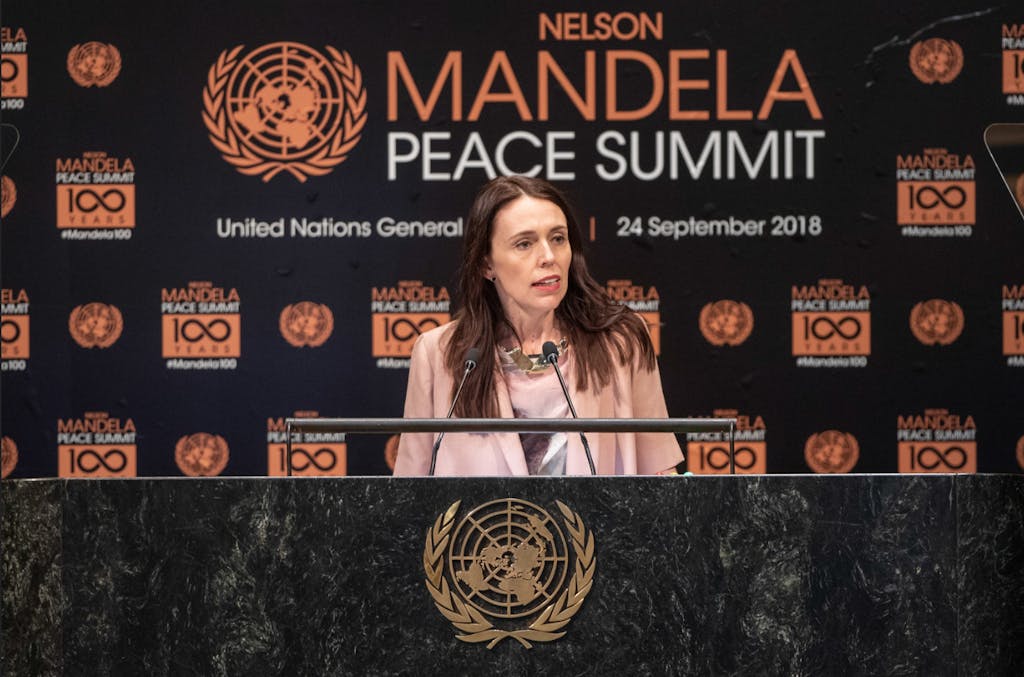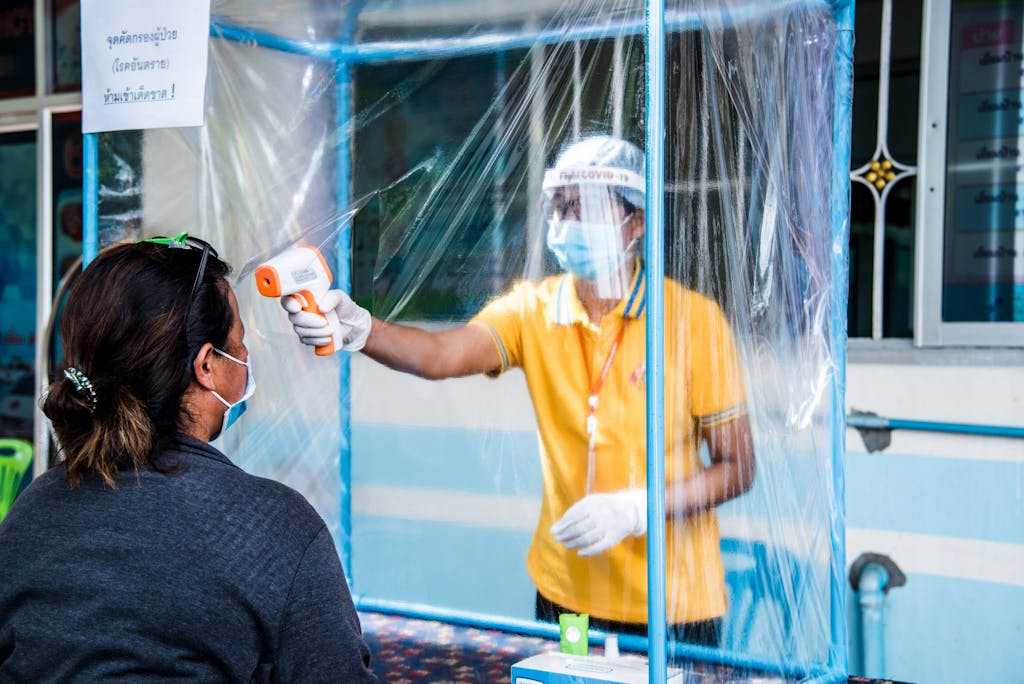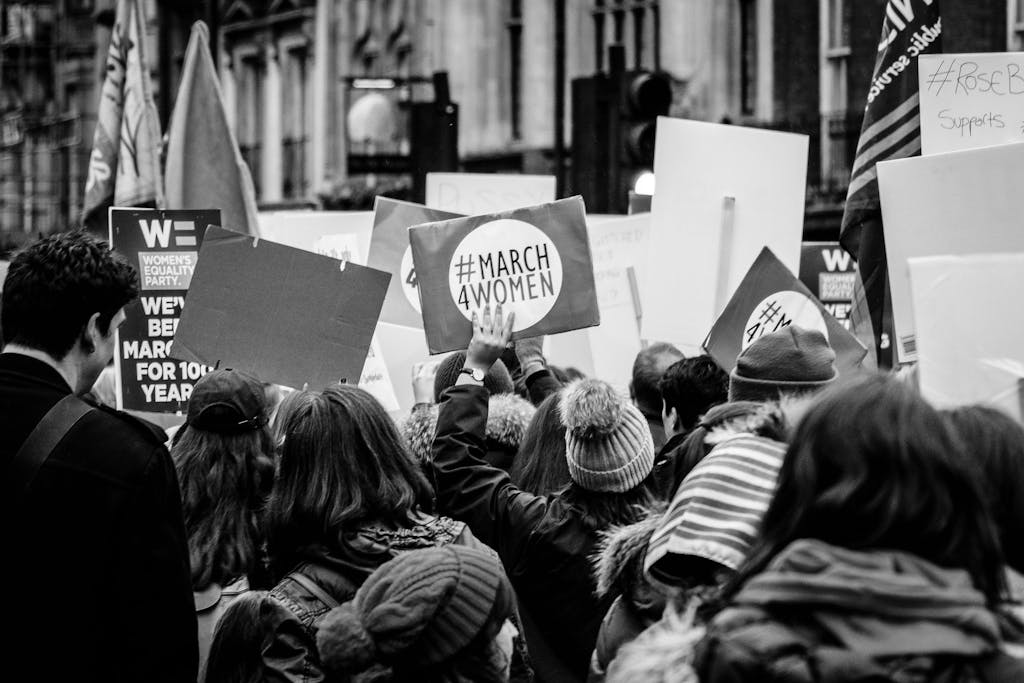The COVID-19 pandemic is reversing progress on girls’ and women’s rights, and shining a bright light on social, political, and economic inequities that persist. We are even further away from a world where girls and women are treated equally to boys and men. Here, our experts reflect on 2020’s major setbacks and how 2021 can be a year to regain ground and redouble efforts to achieve equality for girls and women everywhere.
The COVID-19 virus continues to spread, and nurses and front-line workers are among the many informed voices pleading with the public to abide by safety precautions. The vast majority of these health care workers are women who are risking their own lives and the lives of their families to keep their communities safe. In addition to women’s role in fighting the virus, women and girls around the world have been disproportionately affected during the pandemic, their livelihoods upended, and in far too many cases, their safety threatened. How have women and girls’ rights fared in 2020? And what can we look forward to in 2021 as a global community working on gender equality?
Touching on these themes and more, Geeta Rao Gupta, senior adviser to the 3D Program for Girls and Women and UN Foundation senior fellow, and Michelle Milford Morse, our vice president for Girls and Women Strategy at the UN Foundation, reflect on an unconventional year and look ahead to their plans and outlook for 2021.
Michelle Milford Morse: Geeta, it’s a bit of a silly question, or the setup to a joke, but here goes: Thinking about our work on gender equality, what stood out to you this past year? What will you remember about 2020?
Geeta Rao Gupta: Well, of course 2020 will be forever remembered by most as the year when the world was brought to its knees by an invisible virus. What I will most remember is the way it so quickly exposed the inequities between women and men, the hidden pandemic of violence against women, and the role that women play in the care economy — juggling jobs while caring for and educating their children at home.
I saw this in Pune, India, where our 3D Program works with female waste pickers, informal workers from the most marginalized communities in India who earn their livelihood by collecting and sorting garbage for recycling. They were deemed essential workers early in the pandemic because garbage had to be collected. But they did their job with very little support or protection — facing pressure from their families and neighbors to stay home and walking miles to get to work because public transportation was shut down. They continued doing what they were supposed to do despite these hurdles, while also serving as distributors of essential supplies (including food rations and medicines) to communities in need. Their work ethic and civic sense were an inspiration!
MMM: Indeed! It really puts being asked to just stay home or wear a mask in context.
GRG: Right. The pandemic also called attention — in a stark way — to the way in which domestic violence is a daily reality for women around the world. Due to the shutdowns, they’ve had to remain indoors with their abusers, putting them at extraordinary risk.
It’s not as if the data on domestic violence didn’t exist, or that women’s outsized role in the care economy wasn’t known, but COVID underscored it in a way that wouldn’t have happened otherwise. That is the only positive thing that emerged from this crisis. Now society is forced to pay attention to the way gender inequality, together with other inequalities based on race, class, ethnicity, caste, and other social stratifiers, make some people more vulnerable than others. It revealed those stark realities and their consequences — realities that the world did not pay sufficient attention to before.
MMM: Violence against girls and women continues to be the issue that worries me most when I think about what is standing in the way of a fairer and better world for half its population. I wrote about our need for new allies against gender-based violence in a recent op-ed for The Hill. Readers can also check out the Spotlight Initiative, a global, multiyear partnership between the European Union and the United Nations to eliminate all forms of violence against women and girls, and their #WithHer campaign. Now is definitely the time to stand with her.
GRG: Michelle, what will you most remember about 2020?
MMM: Geeta, like most people, I’m ready to forget! But when I do think about this time, I’ll recall with profound admiration: 1) the nurses and midwives, 2) the leaders of nations, and 3) a tiny but towering U.S. Supreme Court justice.
First, women comprise about 70% of health care workers around the world, so it is largely women working in risky conditions to keep their patients comfortable, calm, and connected to family members. Second, I will think of leaders. Erna Solberg — Norway. Jacinda Ardern — New Zealand. Angela Merkel — Germany. Sheikh Hasina — Bangladesh. Katrín Jakobsdóttir — Iceland. Sanna Marin — Finland. They have led their people with extraordinary grit and grace, prioritizing clarity over confusion, science over skepticism. Recent research across 194 countries pointed to women leaders’ early, decisive action, leading to fewer deaths.
And finally, I will remember that this was the year we said goodbye to Supreme Court Justice Ruth Bader Ginsburg, an essential architect of the legal framework for women’s rights and equality in the United States. We owe so much to her for her insistence on applying the law in service to humanity’s highest ideals and in defense of the least powerful among us.
GRG: Her clarity and conviction will be missed. I joined thousands of others at the Supreme Court in D.C. to pay my respects to Justice Ginsburg a few days after she died. Even though I wasn’t born or raised in this country I wanted to thank her for all that she did for gender equality for two reasons: first, because I know my daughter benefited from many of the opportunities she created for women in this country; and two, because she was and is an icon for women’s rights around the world and that has been my passion and my work for the past four decades.
And like you, I was also struck this year by how countries led by women seemed to weather the COVID crisis better than others.
MMM: Why do you think these leaders have been so fit for purpose? What do we gain when women lead, Geeta?
GRG: There is often an implication that women have inherent qualities that make them better suited to be effective leaders in crisis, or that women are somehow inherently better leaders than men. I don’t agree with that theory. Some women are better at leading than others. The same is true of men. To say that all women are alike does a great disservice to women, and to men, too.
The strongest argument for ensuring women get to lead is that it allows you to increase the diversity of opinion in key decision-making roles. A diversity of perspectives in examining any problem invariably results in a better solution because it takes into consideration a much wider array of variables.
MMM: I once heard a CEO, when asked about if there is a “business case for diversity and inclusion,” answer that there is an overwhelming case for diversity and inclusion and for women’s leadership. But that there is no business case for homogeneity and exclusion. I love that.
GRG: Precisely. Men and women have distinctly different life experiences because of their biological and social differences. Having both at the decision-making table is bound to enrich the conversation and result in better outcomes. We are finding this in our 3D Program work with village women’s collectives in India, where we identify both problems and solutions and hold local governments accountable.
Another reason to ensure gender, class, race, and ethnic diversity among leaders is that it gives you a much larger pool of talent to pick from. If you limit that pool based on any of those individual characteristics, you’re limiting the talent pool from which you can draw the best leader.
Ultimately, though, what we have to consider is not just whether we want men or women in positions of leadership, but rather: What type of leadership is best suited to meet the demands and challenges of the 21st century? What is the most effective type of leadership for the problems that we confront today? I believe that there is a set of principles that define what we call feminist leadership that both women and men must embrace to be effective leaders. In my mind, the most important of those principles are self-awareness, inclusion, accountable collaboration, respectful feedback, and responsible and transparent use of power.
MMM: I would add humility, compassion, and seriousness. The world truly needed humble, compassionate, serious leaders this year.

GRG: What did you see that surprised you this year?
MMM: Well, I’m an optimist. A prisoner of hope. But I’m stunned by the persistence of gender inequality: the degree to which girls and women are routinely demeaned, denied, and discriminated against. For every win, for every small change, we get something truly regressive and infuriating.
For instance, the news that the UK planned to use an all-male team to host the UN climate summit. Last time I checked, girls and women live on this threatened planet, too (not to mention that they will suffer disproportionately from the climate crisis). Or this stunning report released by the Bill & Melinda Gates Foundation that took a careful look at English-language media in six countries, tallying how women showed up. I’m betting you know what they found.
Women are practically invisible, their perspectives and experiences absent from the information that shapes our knowledge and behavior. Not only are women’s voices grossly underrepresented as sources and experts in news stories, the report also found that journalism leadership is dominated by men. COVID-19 journalism, and the composition of COVID-19 task forces, showed the prevalence of this problem, too.
Finally, as long as I’m irritated, I learned recently that several members of Congress didn’t know who Breonna Taylor was. Come on. Do better.
MMM: Geeta, on the topic of stubborn challenges, we also found this year that gender and race can conspire to increase the vulnerability of certain populations over others, which is true with COVID-19. Yet not much has changed. Why is that?
GRG: To understand why those inequalities are not more easily addressed, it is important to acknowledge that the differences based on personal identifiers such as gender, race, caste, and class are not just inequalities in access to resources and opportunities. They signify and hold in place a power dynamic that stratifies society — men typically have more power than women, for example, and the majority race or ethnic group usually has more power than minority groups.
Shifting that dynamic is not easy because it is perceived as a loss of power for those who have held it for so long. But what we have to realize is that in the long term, equality is not a zero-sum game — sharing power makes everyone more powerful!
MMM: Exactly! That’s why earlier this year the UN Foundation launched #EqualEverywhere, a global campaign to call attention to persistent inequities between men and women, and the leaders fighting to close the gap.
Your point also reminds me of the T-shirts that say, “Equality is not a pie. Equal rights for others does not mean fewer rights for you.” It’s a good thing. I want everyone to have equal rights. But I won’t share a chocolate pie. Ask my relatives …
GRG: And I won’t share blueberry pie! There is data to show that when women are provided equality in the labor market, GDP rises. Where we’ve seen significant social change occur for gender equality or racial justice, it has typically been initiated by strong grassroots activist movements such as the women’s movement or the Black Lives Matter movement. When those who have been marginalized and have suffered the indignities of inequality for decades begin to organize and mobilize, we begin to see a shift in that power balance. This is why it is very important to fund grassroots groups and provide them the platforms and forums to convene and organize.
MMM: Geeta, what did this year further clarify for you?
GRG: The importance of better data! Including collecting and using sex-disaggregated data. The usefulness of sex-disaggregated data was made abundantly clear in this pandemic. In most countries, case fatality rates showed that men are more likely than women to die from COVID-19 due to sex differences in biological responses (higher pro-inflammatory immune response among men as compared to a more robust T-cell response among women) and behavioral risk factors (with smoking and other lifestyle habits placing men at greater risk). With this information, health care providers were able to tailor medical treatment by the sex of the patient, providing more effective care to both women and men.

The collection of mortality data by sex also revealed exceptions to the rule. A recent study found that in India, Nepal, Vietnam, and Slovenia, case fatality rates for COVID-19 were higher among women than men. In India, for example, the case fatality rate for men is 2.9%, compared to 3.3% for women. Sadly, studies suggest that some of this reversal of the global trend could be due to the well-documented differences in access to health services in India, with girls and women less likely to receive timely health care than boys or men — which also reveals the impact of underlying gender norms, such as son preference, on health outcomes and further establishes the value of sex-disaggregated data.
Without sex-disaggregated data, those realities would not have been revealed. I hope this proves, once and for all, how imperative it is to report medical, social, and economic data in a sex-disaggregated way.
MMM: As our colleagues at Data2X say, without data equality, there is no gender equality. Geeta, what did you find encouraging in 2020?
GRG: Well, we have a woman as vice president of the United States. Finally. The diversity that Kamala Harris represents, especially that she is half Indian, is extremely meaningful to me. When I first arrived in the U.S. in 1985, there were no women of Indian heritage in public office and very few women of color in any positions of leadership. It is a whole new world now! It is inspiring to see progressive women of color in Congress and now in the Office of the Vice President. I know that seeing Vice President-elect Kamala Harris up there will give young girls of color a new sense of possibility. It is definitely a reason to celebrate; we have finally broken through one barrier that our country couldn’t seem to get past!
MMM: “Meanwhile, close to 70 women leaders have led countries since 1960…So, I’m thrilled to see the VP barrier busted for the U.S. But I want my country to lead for women and be led by one.”
MMM: Geeta, what are your 2021 work goals and resolutions?
GRG: I’m excited for next year’s Generation Equality Forum, which I hope will be held in person if all goes well. It was a huge loss to the community and field that we couldn’t celebrate the 25th anniversary of the Fourth World Conference on Women this year, so I hope we can do that in 2021.

MMM: Me, too. 2021 will offer a once-in-a-generation opportunity to establish a new agenda for urgent action on gender equality. UN Women, in collaboration with the governments of Mexico and France, and philanthropic, private sector, and civil society leaders, will host two Generation Equality events in Mexico City in March and Paris in June that will gather advocates from around the world to galvanize and consolidate action for the full realization of the gender equality agenda.
Harnessing the full attention and high ambition of all sectors — governments, philanthropists, private sector leaders, civil society advocates — is what we need to do now, to ensure that Paris is not just another government meeting, but a turning point when this agenda finally takes flight.
We are finally getting our moment, Geeta!
GRG: I am grateful for that. And so many things. 2020 taught me how privileged I am and how grateful I should be for everything I have — a loving family, my health, a job I love, a roof over my head, food on my table, and a large network of friends and colleagues who I can count on in times of need. I want to hold on to that feeling of immense gratitude and never forget how blessed I am. I also want to continue to use my experience and expertise to the best of my ability to advance what has been my life’s goal: to achieve gender equality and promote the rights of girls and women, worldwide.
GRG: Michelle, what are your resolutions?
MMM: I’m going to follow the instructions of the late and deeply admired Rep. John Lewis and “get in good trouble.” I’m going to talk less and listen more. I’m going to make space for others. I’m going to extol the glory and essential role of the UN to whoever will listen.
I’m going to sing in the shower, dance in the kitchen — and especially when we get the transformative new global agenda for gender equality and action at Generation Equality!
I’m going to give away what I can.
I’m going to thank my brilliant, funny, and equal-minded partner every day.
I’m going to honor my deep sense of gratitude. And, when it’s safe, I’m going to hug everyone I know!
Featured Photo: Fauzan Ijazah/ UNICEF




 View All Blog Posts
View All Blog Posts



